The Arab Center for Research and Policy Studies (ACRPS) in Doha, Qatar, published its annual Arab Opinion Index for 2016, which measures public opinion across the Arab world. The 2016 Index was conducted in 12 countries: Algeria, Egypt, Iraq, Jordan, Kuwait, Lebanon, Mauritania, Morocco, Palestine, Saudi Arabia, Sudan, and Tunisia. It was conducted in face-to-face interviews with 18,310 respondents equally divided between men and women. Sampling followed a randomized, stratified, multistage, and self-weighted clustered approach, giving an overall margin of error between +/- 2 and 3 percent for the individual country samples. The overall samples guarantee probability proportional to size (PPS), ensuring fairness in the representation of various population segments. The survey was conducted by 840 individuals (half men and half women) who visited the respondents in their places of residence across the countries surveyed. In its fifth year, the Index remains the largest of its kind in the Arab world.
Aiming to cover as many salient issues as possible, the Index is divided into eight separate sections and compiles respondents’ views on different aspects of these issues. The following sections summarize many of the findings of the Index, using a selection of visual aids and charts.
Note that some findings included in this summary are not accompanied by charts; for additional information, please consult the full 2016 Arab Opinion Index report available on the ACRPS website.
SECTION 1: Living Conditions of Arab Citizenry
- An aggregate majority (69 percent) of all Arab respondents said that their household income is sufficient for living.
- Forty-nine percent indicated that they cannot save any money, whereas twenty-nine percent said they were “in need” to cover necessary expenditures and had to rely on family and friends and on handouts to make ends meet. These figures have remained stable over the last five years.
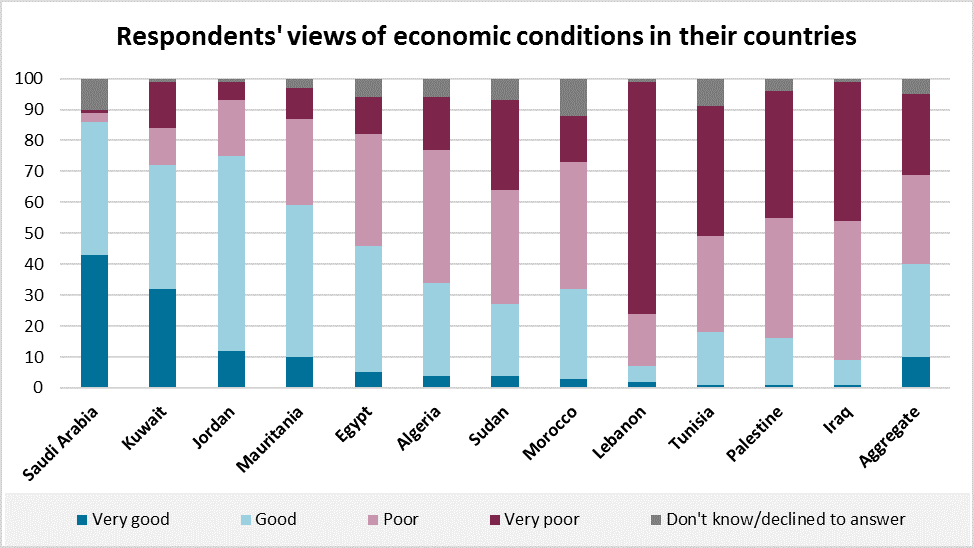
- Only 41 percent of Arab respondents viewed the political situation in their countries positively, but the responses varied widely among countries. For example, 83 percent of Saudi Arabians perceived the political atmosphere in their country as good or very good, compared with only 10 percent of Lebanese respondents; fully 65 percent of Lebanese respondents saw their situation as very bad.
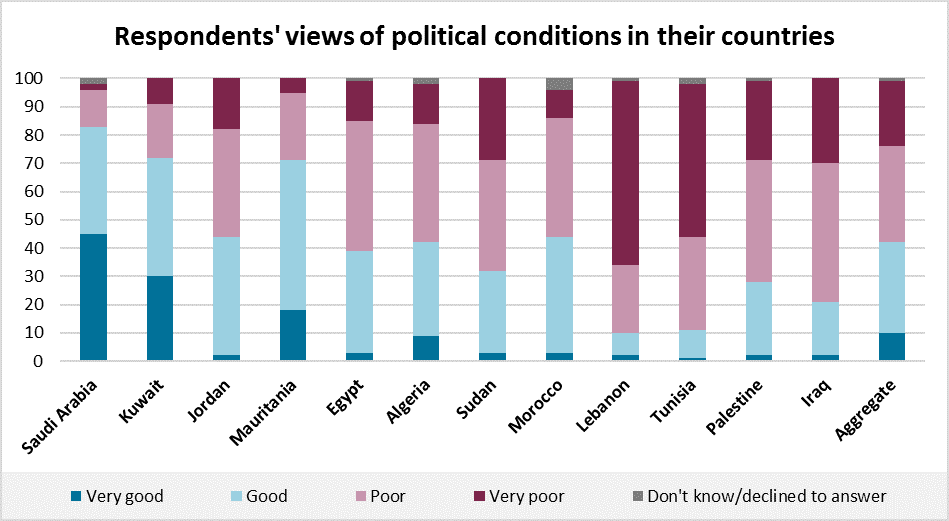
- When asked about security in their country, Fifty-nine percent of overall respondents were satisfied with their safety and security while 40 percent viewed security negatively, with great variation among the Arab countries.
SECTION 2: Views of Institutions and Governmental Effectiveness
- Arab Respondents showed a lower level of confidence in governments and civilian institutions in comparison to the armed forces or security organizations. Fifty-five percent of all respondents expressed a high degree of confidence, or said they were “confident, to some extent,” in governments and ministries, 44 percent in legislatures and parliaments, and 31 percent in political parties. On the other hand, 87 percent expressed high and moderate confidence in the armed forces, 70 percent in security organizations, and 72 percent in the police. The judiciary received an aggregate 65 percent high and moderate confidence.
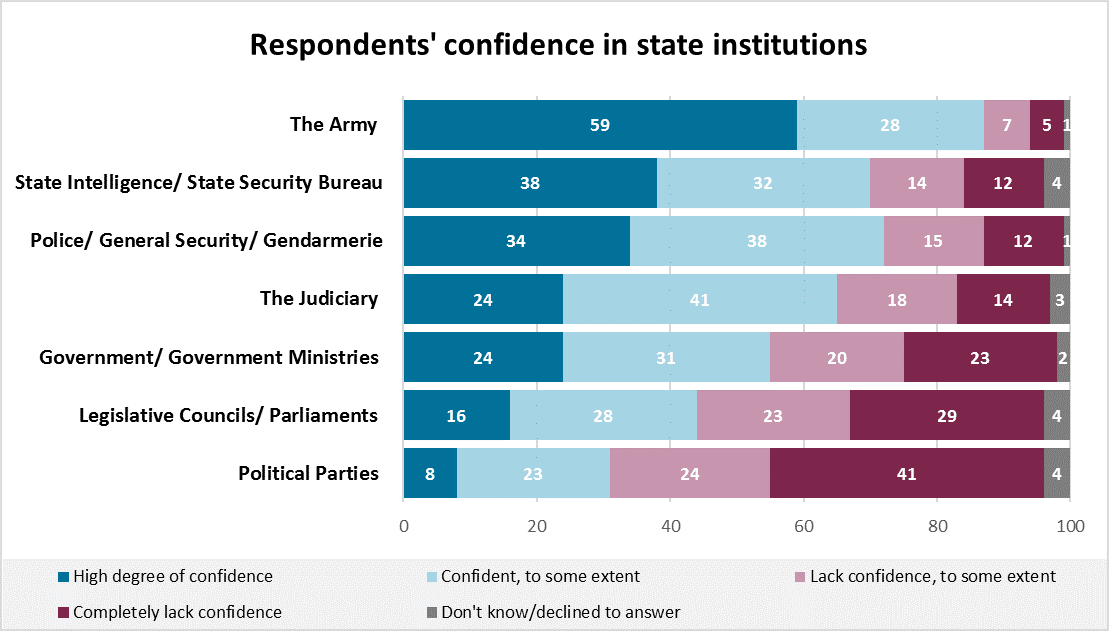
- The 2016 Arab Opinion Index showed close similarities to respondents’ views about the issue of corruption in previous years. Seventy-nine percent of Arab respondents viewed corruption to be widespread.
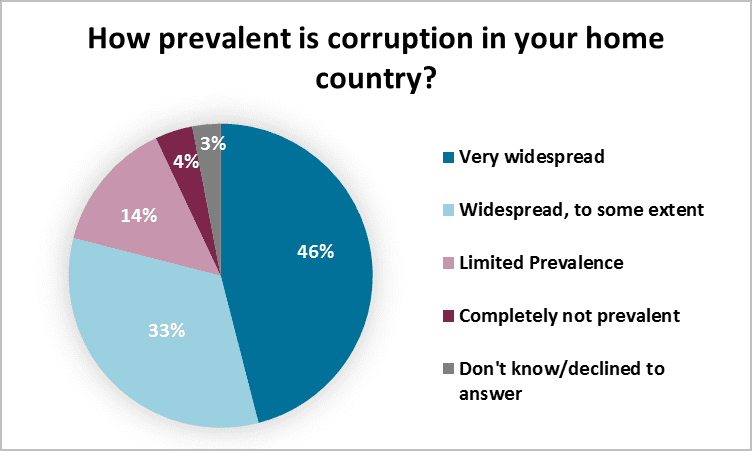
- Less than a quarter (24 percent) of respondents believed that the rule of law is applied universally in their countries, while only 40 percent thought that fair trial principles are upheld, a belief that continued from previous years’ data.
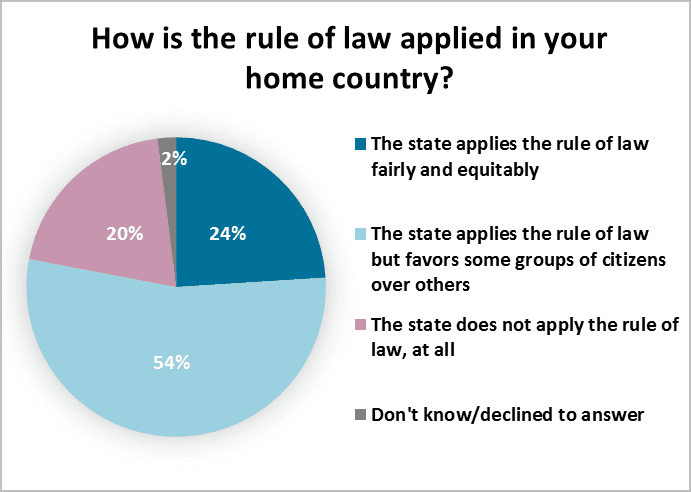
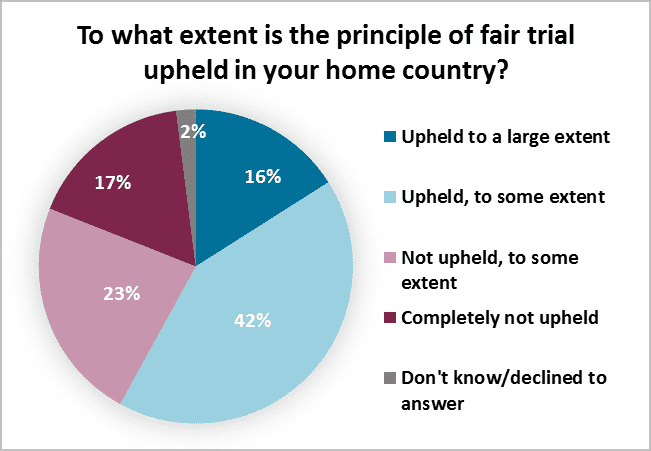
SECTION 3: Attitudes towards Democracy
- An aggregate 77 percent of respondents considered democracy to be the most appropriate system of government for their countries. By comparison, only 34 percent considered a government built on Islamic Shari`a to be appropriate; 29 percent that electoral competition should be only between Islamist parties; 21 percent that this competition be limited to non-religious and secular parties; and 18 percent that an undemocratic or authoritarian government is appropriate.
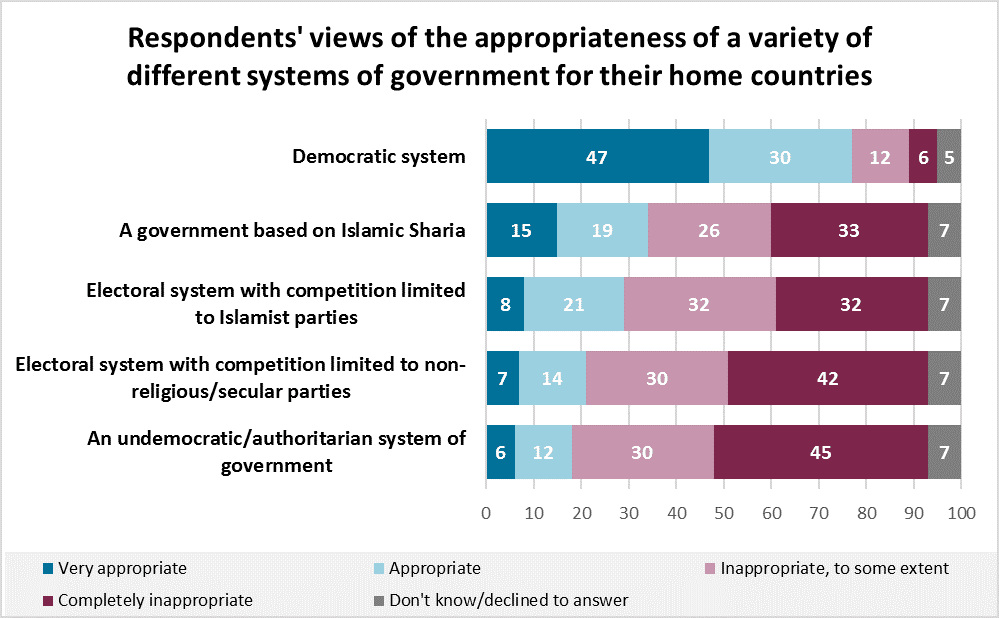
- Eighty-nine percent of Arab respondents provided coherent definitions of democracy in Arab society; chiefly, 33 percent said it safeguards civil and political rights, 26 percent thought it guaranteed equality and justice between citizens, and 11 percent defined it in terms of the system of government including the peaceful transfer of power and institutional checks and balances.
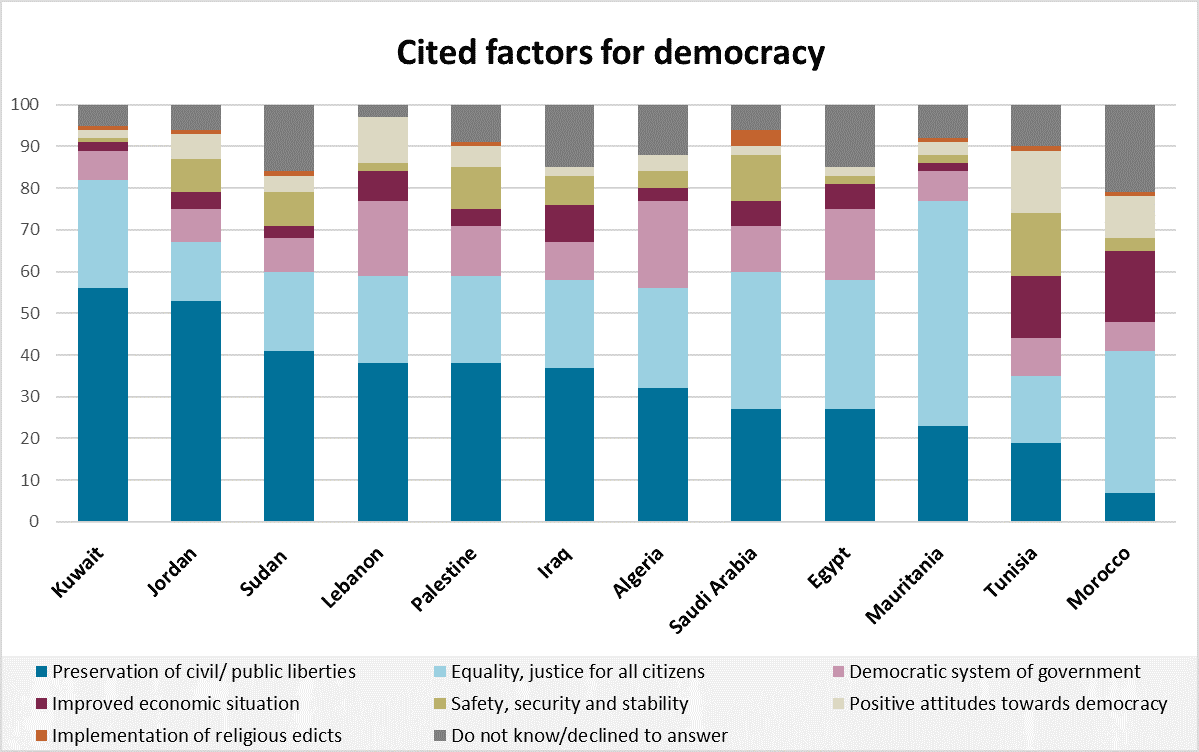
- A majority of respondents disagreed with a set of statements about democracy: 67 percent (23 strongly) disagreed that democracy is not effective in maintaining security and order; 68 percent (23 strongly) that economic performance suffers in a democracy; 70 percent (28 strongly) that it is incompatible with Islam; 58 percent (19 strongly) that democracies are characterized by indecision and discord; and a plurality, 49 percent (17 strongly), that their society is not prepared for democracy (only 43 percent believed that it is, 13 percent strongly).
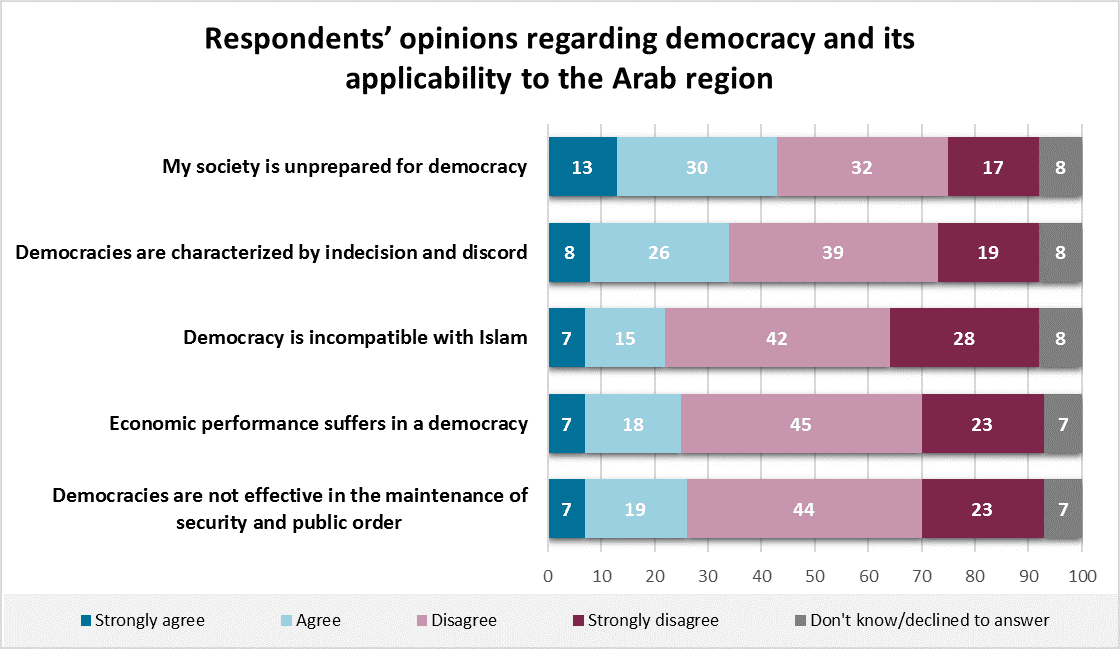
- A slim majority (54 percent) of Arab respondents said they would accept an electoral victory and rise to power of a political party they disagreed with (while 40 percent said they would not). This was similar to results of the previous years of the Index.
- An aggregate 56 percent of respondents said they felt free to criticize their governments without fear of retribution, down from 63 percent in 2012-2013.
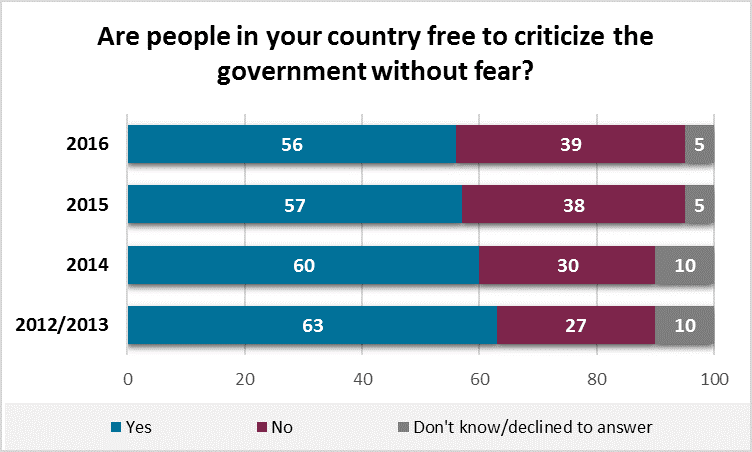
- Only 41 percent of Egyptians said they felt free to criticize their government without fear, 35 percent of Palestinians, and 29 percent of Sudanese. Tunisians were most free to criticize their government (81 percent), followed by the Lebanese (77 percent), Mauritanians (72 percent), and Iraqis (67 percent).
SECTION 4: Civic and Political Participation
- Like the results of previous indexes, the 2016 data showed diminished interest among Arab citizens in political affairs. Fifty-nine percent of respondents reported limited or no concern (34 and 25 percent, respectively), compared to 56 percent in 2015, 59 percent in 2014, 49 percent in 2012-2013, and 57 percent in 2011.
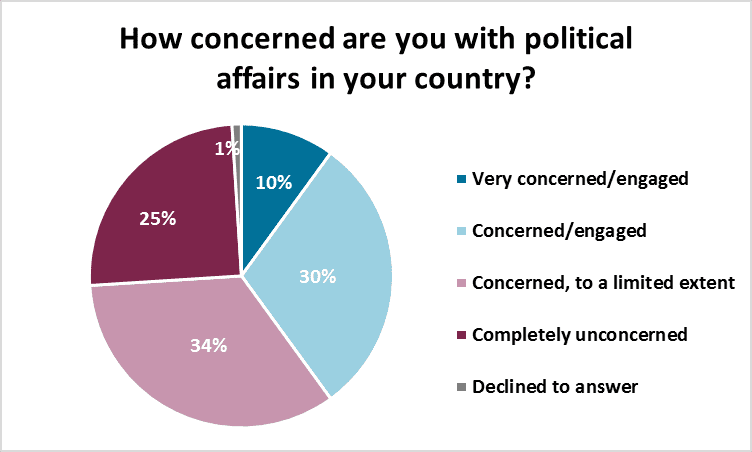
- A majority of Arabs (53 percent) have no affiliation with political parties, nor do they believe that any political party or group represents their views.
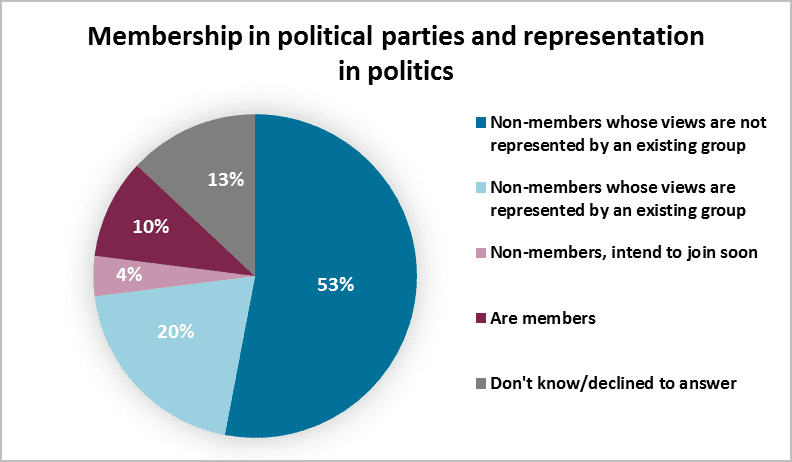
- In terms of civic engagement, only 13 percent of respondents belonged to voluntary organizations in 2016, 12 percent to family-based associations, 9 percent to cultural clubs, 8 percent to professional syndicates, 7 percent to religious associations, and 5 percent to a labor or trade union.
- Regarding information and current affairs, over two-thirds of Arab respondents (68 percent) reported receiving their news from television, 13 percent from internet sources, and 6 percent each from radio and newspapers. Reflecting socioeconomic conditions and accessibility, Lebanon had the highest television viewership (89 percent) and Mauritania the lowest at 46 percent.
- Sixty-one percent of Arab respondents reported that they are internet users; of these, 82 percent have Facebook accounts, 33 percent have Twitter, 32 percent have Instagram, 28 percent YouTube, and 23 percent Snapchat. Seventy percent of social media account holders used social media to get their political news.
SECTION 5: Religion and Religiosity in Public Life
- The majority of Arab respondents (65 percent) reported being “religious to some extent,” 20 percent “very religious,” and only 11 percent “not religious.” Most described “religiosity” in terms of the individual’s morality and values and not in terms of actual religious practices.
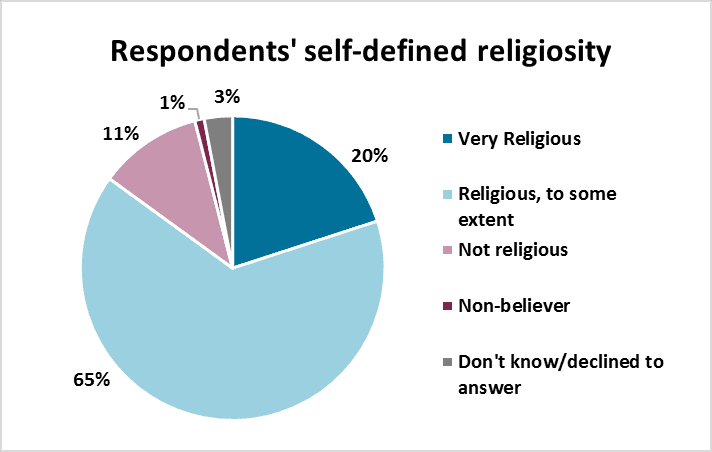
- Majorities of Arab respondents reported openness on religious matters. While 35 percent of respondents said they preferred dealing with religious people and 9 percent preferred non-religious people, 54 percent had no preference between the two groups.
- A large majority of Arab respondents, 73 percent (27 percent strongly), agreed with the statement that “no religious authority is entitled to declare followers of other religions infidels.” Lebanon’s data led the countries with a majority of 86 percent (49 percent strongly), followed by Tunisia (82 percent, 57 percent strongly). Algeria was lowest with 49 percent (20 percent strongly) in comparison with 41 percent who considered the declaration favorable.
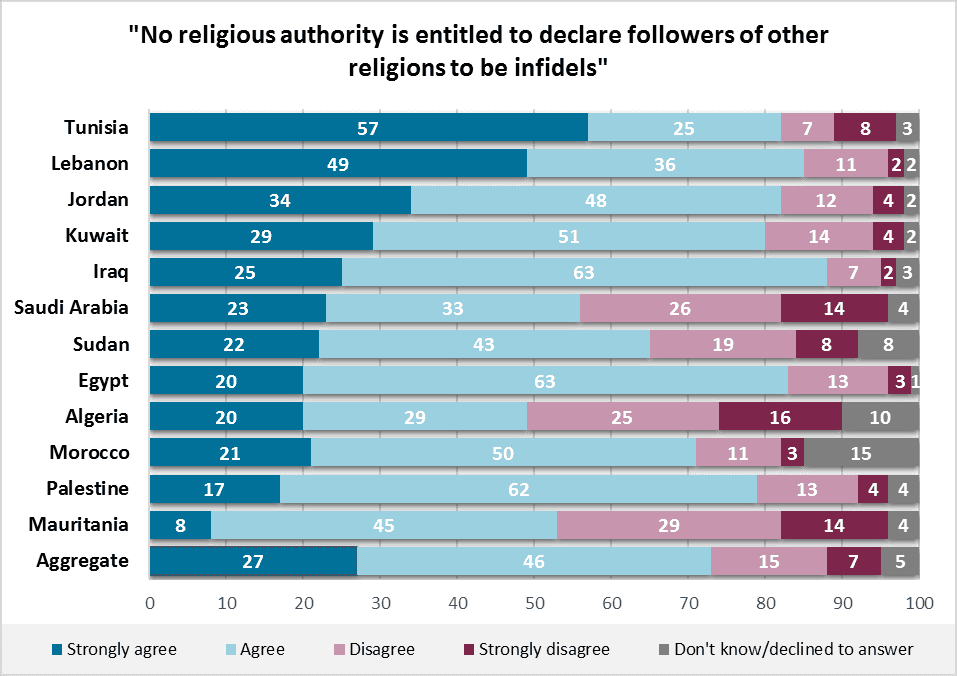
- While religious, the Arab public indicated disagreement with the idea that all those who are not religious are necessarily “bad people.” Instead, data suggests that people in the Arab countries tend to be tolerant of the religious beliefs of others. To wit, the 2016 data show that fully 73 percent of Arab respondents disagreed with the idea that those who are non-religious are bad people. This is consistent with previous years.
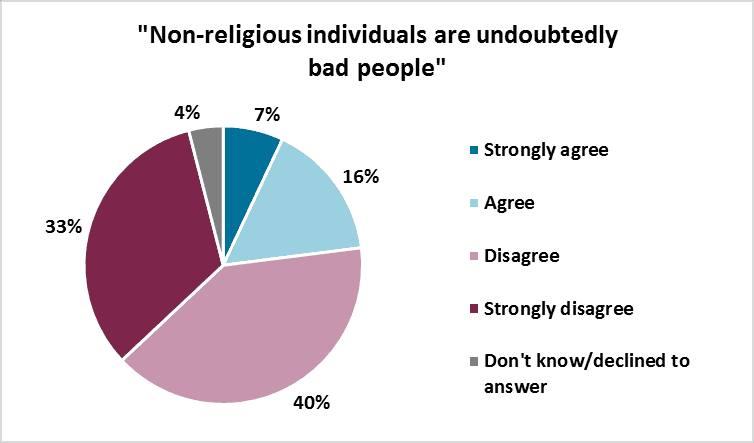
- Seventy-four percent (29 percent strongly) said governments had no right to use religion to win support for their policies.
- A small majority (53 percent, 23 strongly) thought it was better to separate religion from politics.
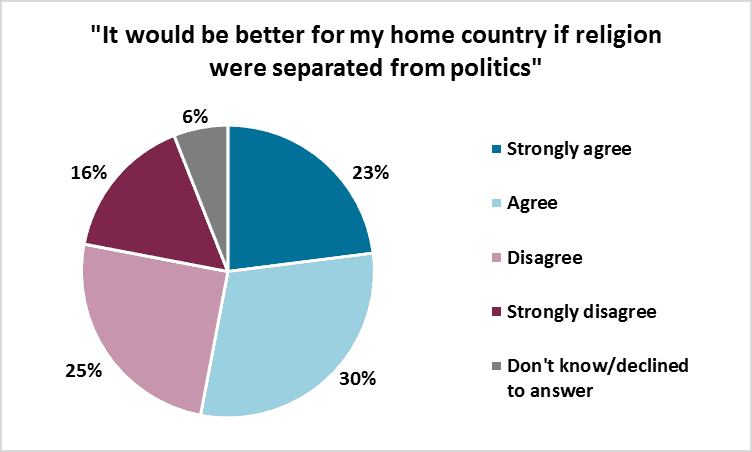
SECTION 6: Palestine and Intra-Arab Relations
- Fully 89 percent of Arab respondents indicated that Israel constitutes a threat to security and stability in the region.
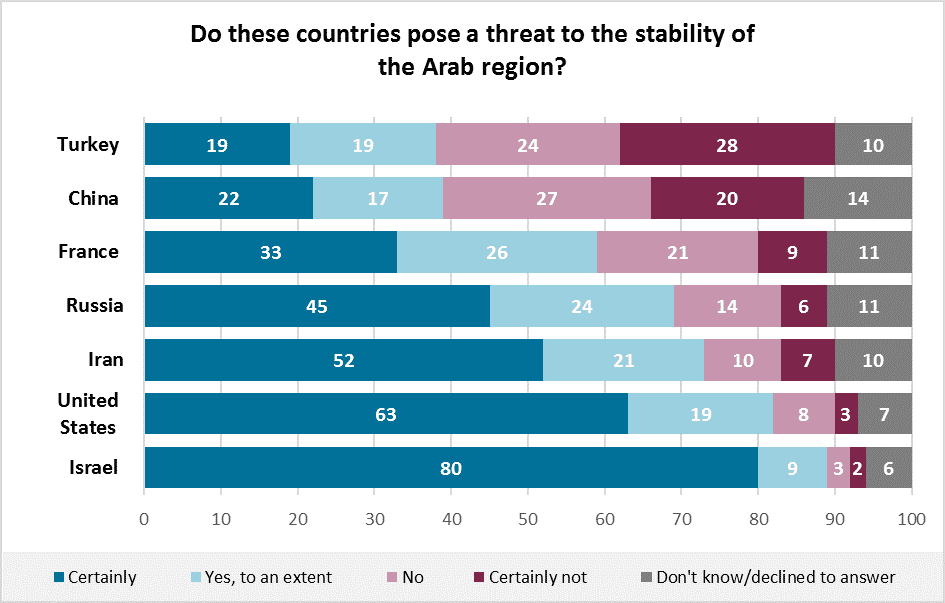
- While a majority (86 percent) of Arab respondents disapproved of their countries’ recognition of Israel, when asked to elaborate on the reasons for their positions, Arab respondents cited Israeli racism towards the Palestinians and its colonialist, expansionist policies. In fact, half of those who accepted their countries’ recognition of Israel said that this required the establishment of a Palestinian state.
- Regarding the issue of Palestine, three-quarters of Arabs (75 percent) considered the Palestinian cause as a concern to all Arabs, compared to 17 percent who believed it only concerns Palestinians. Most disapproved of past peace initiatives including the Camp David Accords (Egypt-Israel), the Oslo Agreement (PLO-Israel), and Wadi Arabi (Jordan-Israel).
- A majority of respondents (77 percent) considered Arabs to form a single nation, in contrast to 19 percent who said that people across the Arab world are distinct peoples.
- Regional views of foreign powers, Arabs have negative views of regional and global powers’ positions vis-à-vis the Arab region. Around 75 percent have negative views of American policy toward the Arab countries, 71 percent of Iran’s policies, 66 percent of Russia’s, 57 percent of France’s, 42 percent of China’s, and 34 percent of Turkey’s.
- When asked to look at specific US foreign policy areas, vast majorities of Arabs had negative views of US policy toward Palestine (80 percent), Syria (77 percent), Iraq (78 percent), Yemen (71 percent), and Libya (72 percent).
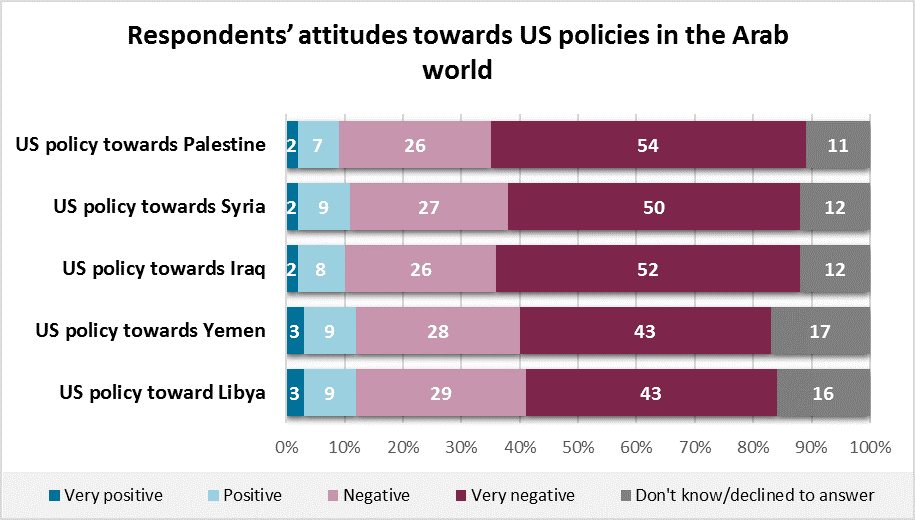
SECTION 7: Arab Public Opinion and the “Arab Spring”
- The year 2011 witnessed a continuation of the decline, since 2012-2013, in Arab respondents’ positive attitudes toward the Arab Spring. In 2016, 50 percent of the respondents regarded the Arab Spring and its attendant consequences to be negative, while 41 percent regarded them as positive.
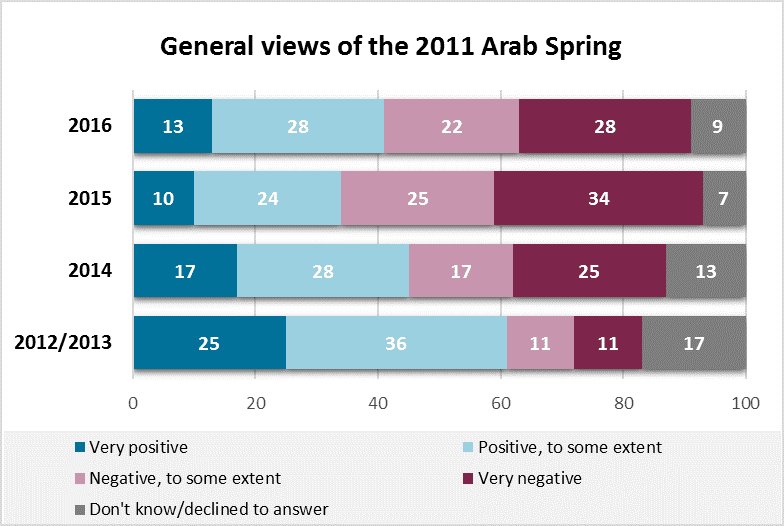
- Egypt led those countries with positive views of the Arab Spring (78 percent), Tunisia came next with 71 percent, and a surprising 55 percent in Saudi Arabia and 65 percent in Kuwait. Jordan led the countries with negative views (75 percent), followed by Lebanon (65 percent), and Algeria (61 percent).
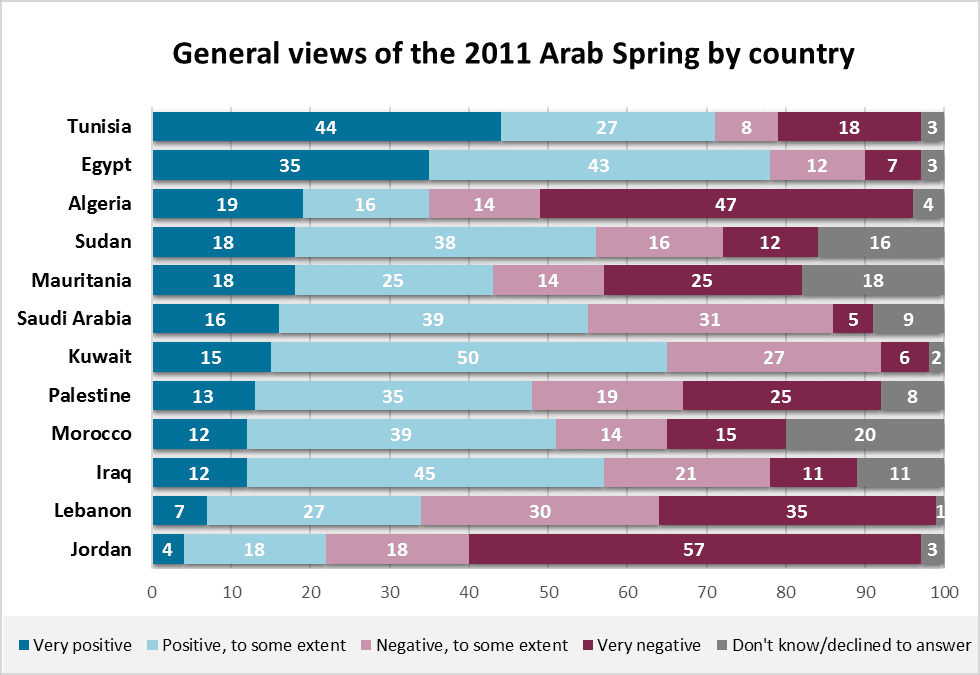
- As for future trends, 45 percent of Arabs continued to believe the Arab Spring would ultimately achieve its aims, while 39 percent indicated that the Arab Spring has been aborted.
- Regarding Islamists and secularists, 52 percent expressed their fears about the rise of Islamist governments (while 42 percent had no worries), compared to 59 percent who expressed fears about the rise of secularist governments (while 33 percent had no worries).
SECTION 8: Arab Public Opinion towards ISIL
- An overwhelming majority of Arab respondents (89 percent) in all the Arab countries surveyed had negative views of ISIL, while 2 percent had “very positive” views and 3 percent had “positive, to some extent” views.
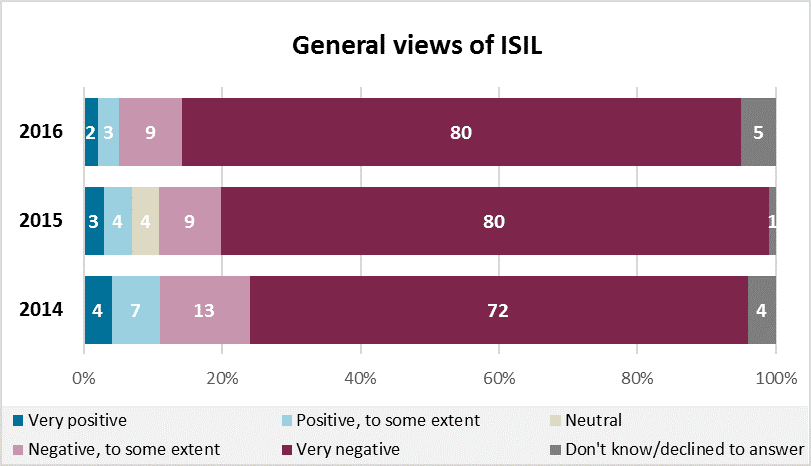
- Ninety-nine percent of Arab respondents said they were aware of ISIL and 66 percent followed its news, 75 percent of whom did so through television.
- Of the 5 percent who had favorable views of ISIL, these views did not correlate with religion: those who identified themselves as “not religious” were as likely to have favorable views as those who said they were “very religious.” There was no correlation between attitudes toward ISIL and the respondents’ attitudes about the role of religion in public life.
- When asked about factors helping ISIL recruit in Arab countries, 22 percent cited economic difficulties, 18 percent “brainwashing” and “propaganda,” 17 percent religious rhetoric, 11 percent domestic political concerns, 7 percent marginalization and inequality, 6 percent attributed it to extremist individuals and 5 percent to the desire to fight foreign powers.
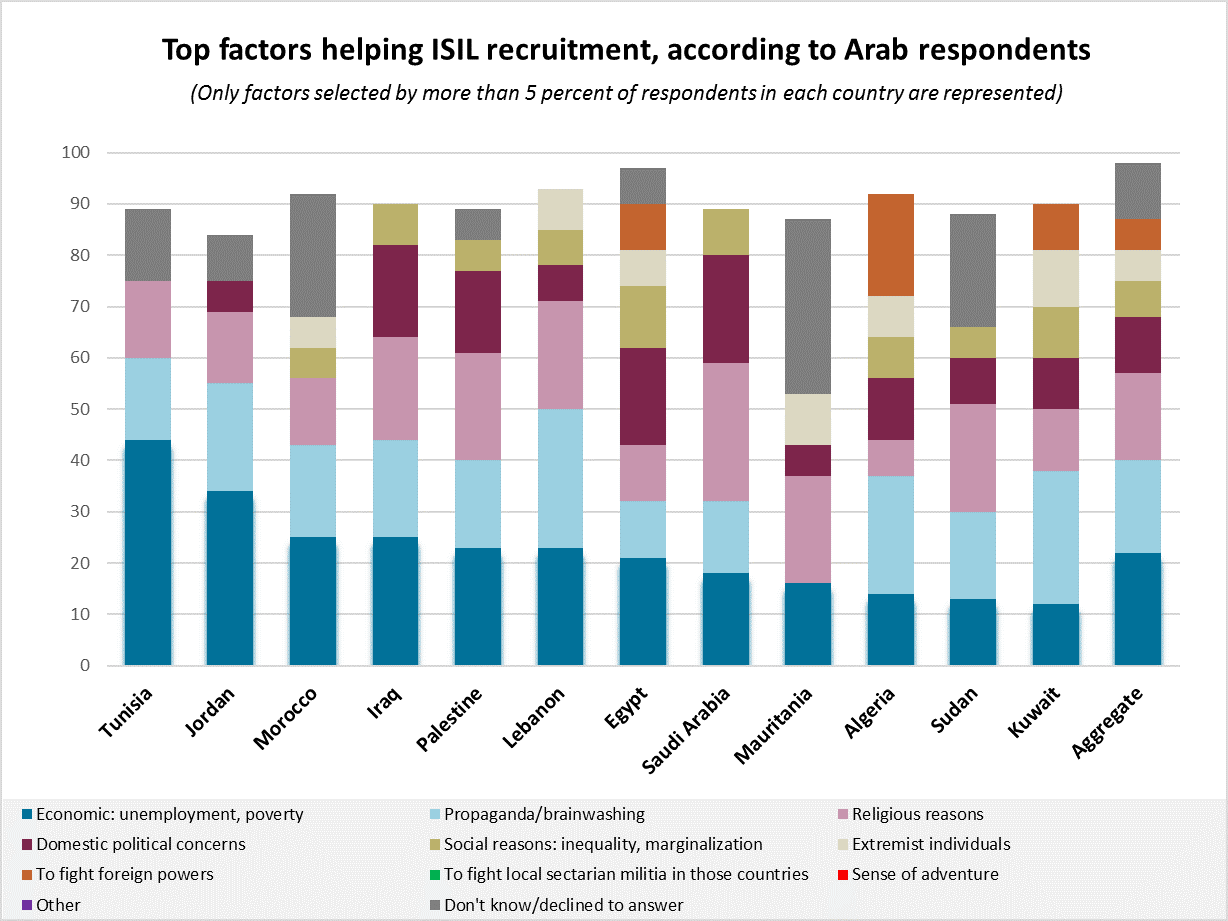
- In comparing external and internal factors, fifty-eight percent of Arab respondents attributed ISIL’s existence to the policies of foreign powers while 29 percent said it was due to internal conflicts in the Middle East. But when asked if “ISIL is a product of the religious extremism and fanaticism in the Middle East,” 43 percent said it was, while 35 percent said it was the product of the policies of Arab regimes.
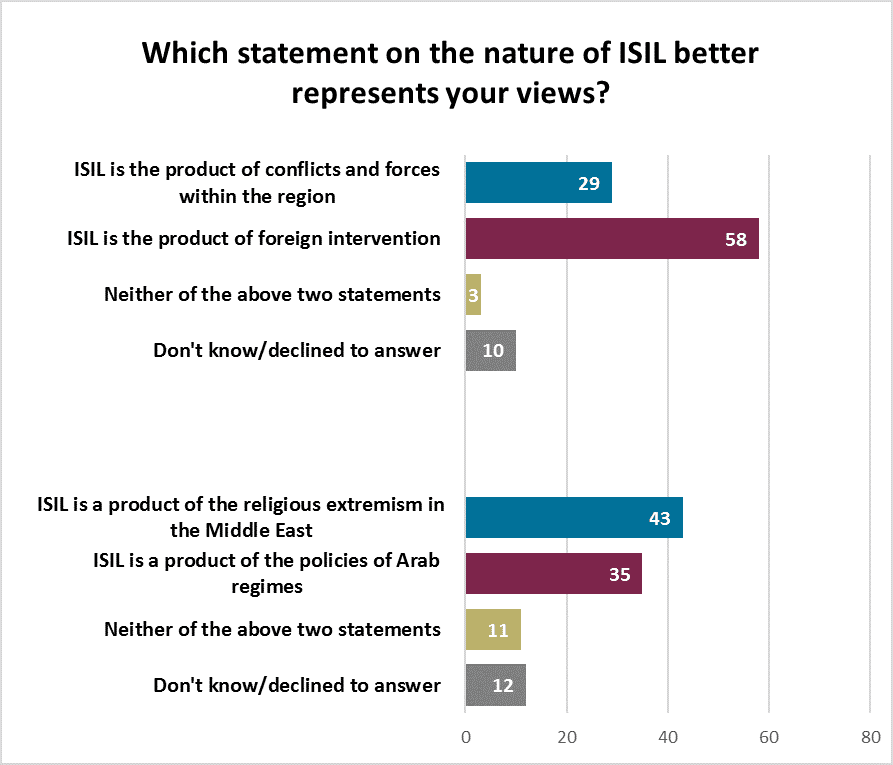
- Regarding the means to combat ISIL, 17 percent of Arab respondents said it should be militarily, 15 percent said through ending foreign intervention in the region, 14 percent said resolving the Palestine question, 14 percent said through democratic transition, 12 percent said finding a resolution to the Syrian crisis, and fewer responses (in single digits) dealt with economic issues, purging extremist interpretations of Islam, and ending sectarian politics, with only 2 percent believing combating ISIL should be done through spreading a culture of tolerance, and 1 percent finding a resolution of the Libyan crisis.
